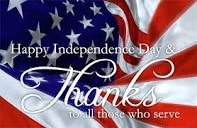So adamant are the secularists that they cannot stand the idea that there was any hint of Christianity or Christian doctrine in or behind the Declaration of Independence. So engrained in our post modern thinking and the antagonism of our politics that few discussions about the theological import of the Declaration can even be held. This is the 241st anniversary of one of the most important documents in history and the people who are the beneficiaries of it cannot agree on what it was about or the dispositions of those who wrote it. As one millennial commentator said in that generation’s usual inimitable clarity “it was written by a bunch of rich, fat, white, slaveholding men who didn’t want to pay taxes”. That is the sort of jingoistic mush that we are accustomed to today and reflects the kind of shallow nonsense we have been taught for generations now.
In a sermon on Sunday I mentioned that not only was the Declaration of Independence just that, it was also an explanation and a defense against the accusation that the colonies were breaking faith with Paul’s words in Romans 13. Of course there were some who disagreed with me with the old saw that the signers were sons of the Enlightenment and that theology was the farthest thing from their minds. The canard has been for years that the signers were mostly deists at best and atheists at worst. The argument has gotten so ridiculous that defenders of the faith of the signers have said that half of them were clergy, (Mike Huckabee), and the equally silly claim that none of them were. The truth is a bit more complicated and takes some study and that is why we have trouble finding the truth. We will look at that aspect tomorrow.
There is a deep reservoir of material out there that begs for more Christians to study. It has to do with the theological discussions that took place for 11 years before the Declaration came into being. There were theological studies undertaken on the Divine Right of Kings and Romans 13. There was also a great deal of discussion over the doctrine of offensive and defensive war. Luther and Calvin and Zwingli were being studied and if one looks carefully it seems that there was a tremendous amount of theological discussion taking place everywhere. Modern scholars act as if the pre-declaration America was basically irreligious and interested in kitchen table economics. A quick look shows that the colonies were a turmoil of heavy theological debate.
It was not just the Founders who were studying. It was the farmers and the tradesmen and laborers as well. There were even catechisms written to explain the difference between self defense and offensive warfare. “The Rights of the Colonists as Christians. . . . may be best understood by reading and carefully studying the institutes of the great Law Giver and Head of the Christian Church, which are to be found clearly written and promulgated in the New Testament”, said Samuel Adams. * They made pointed theological arguments that the colonies were not traitors or anarchists. Remembering the debates of the issues years later, the Declaration being adopted whn he was a teenager, John Quincy Adams wrote, “There was no anarchy. . . . the people of the North American union and of its constituent states were associated bodies of civilized men and Christians in a state of nature but not of anarchy. They were bound by the laws of God (which they all) and by the laws of the Gospel (which they nearly all) acknowledged as the rules of their conduct.”#
There were public examinations of reconciliation from a Biblical perspective that led to political actions seeking to be reconciled with a tyrannical lunatic (George III). Petition after petition, one even entitled “The Olive Branch Petition” were met with military force. That led to a consensus it seems, that self defense would be a permissible reaction in the circumstances of the colonies. It should be noted that it was inculcated into militias that they were not to fire their weapons unless they were fired upon. From Boston Commons to Lexington the colonists never initiated battle.
So rather than being a non religious document, the Declaration is a well reasoned and beautifully poetic development of two syllogisms.
Premise 1. Government is ordained by God.
Premise 2. Tyrants usurp God’s ordination and go against God’s will.
Conclusion, Rebellion against tyrants is obedience to God.
So popular was the conclusion that it was proposed by some to be the motto of the new America one month after the Declaration.
The second syllogism would go something like this.
Premise 1. Governments are ordained by God to protect the rights of the innocent.
Premise 2. When Governments take away rights they injure the innocent.
Conclusion. The innocent have a God given right of self defense.
So Happy 4th. If you are in the study mood and want to know what God thinks about the Divine Right of Kings, read 1 Samuel 8.
*Samuel Adams, The Life and Public Services of Samuel Adams, William V. Wells, editor (Boston: Little, Brown, and Company, 1865), Vol. I, p. 504.
#John Quincy Adams, An Address Delivered at the Request of the Committee of Arrangements for the Celebrating the Anniversary of Independence at the City of Washington on the Fourth of July 1821 upon the Occasion of Reading The Declaration of Independence (Cambridge: Hilliard and Metcalf, 1821


